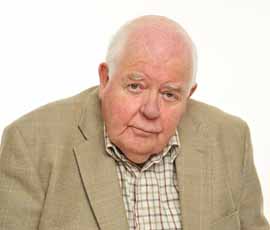David Richardson: Chinese market raises meaty questions

A little over four years ago, our farm study tour was taken to a food market in the Chinese city of Canton.
There were dozens of different green vegetables on display, reflecting how much the Chinese diet relies on fresh produce. And then we came to the meat section. There were a few stalls selling lumps of unidentifiable cut meat, but for the most part the “meat”, like the vegetables, was fresh. In other words, still alive.
There in metal cages lined up along the pavement was a selection of such creatures as dogs, cats, rats, terrapins whose shells had been ripped from their bodies ready for cooking, snakes and, more conventional to our eyes, several chickens. Customers were buying the live animals, tying them to their bicycles with bits of string and taking them home to kill and cook for supper.
Our guide explained the reason the “meat” was taken home alive was to ensure it was fresh; also that few houses had refrigerators. That way, she said we do not have upset stomachs.
She was a very sophisticated and highly educated woman who informed us of ancient Chinese history and the poems of philosophers such as Confucius. But her familiarity with what went on in the meat market disgusted the members of our British party. I pointed this out to her as gently and politely as possible, to which she replied: “But such meats are delicious. You should taste them for yourself. I don’t understand why you don’t eat them, too.”.
Memories of that visit have flooded back as I read the rash of stories about horsemeat in items such as burgers and lasagne. Horsemeat is safe to eat, provided it is free of drugs such as bute, administered when the animals get stiff joints and which may cause liver of kidney problems in humans.
It’s just that, as with dogs and cats and the other animals commonly consumed in China, eating horses does not suit our culture.
The episode has also undermined consumer confidence in this country and in other European nations, too, where eating horse has been commonplace for years. More seriously, it has inevitably caused consumers to question the accuracy of food labels on all sorts of other products, trust which has been so carefully nurtured by farmers and others along the food chain.
I have no knowledge other than what I have read in the papers of the background to the crimes (and criminality must have been involved), except that it appears to have spread across most of Europe. But the motivation could only have been to cut the cost of processed products in which the origins of the meat could be hidden. Indeed, without DNA tests those origins would have remained unknown.
The other disturbing aspect of the situation is that hundreds, if not thousands, of people working in the meat processing industry across Europe must have known what was going on, but said nothing.
The probability is that human health has not been jeopardised. But consumer trust has. Some new angle seems to appear every day and I fear the story could run and run. As many consumers have already recognised, this is the time to avoid mass-markets and deal with local butchers who buy their assured meat from local farmers. This provides genuine traceability of the kind that is masked when ingredients from a variety of sources are brought together in the interests of low prices. Cheap can be very nasty.
Full horsemeat scandal coverage
Read more from all our Opinion writers
What do you think about the horsemeat scandal?
